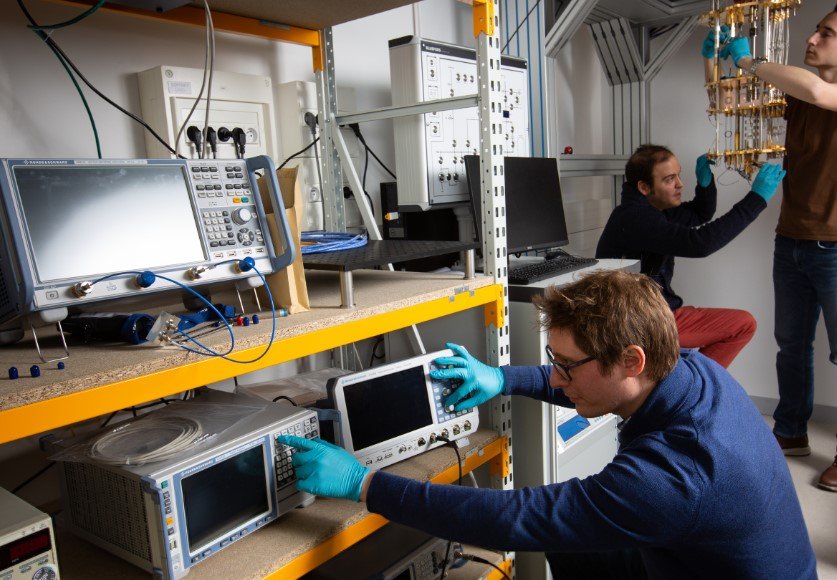In a bold joint move underscoring the growing fusion of tech diplomacy and strategic alliances, the United States and Israel are setting up a $200 million science and innovation center devoted to artificial intelligence and quantum computing. The project—set to span at least five years—is not just about scientific breakthroughs. It’s about geopolitical muscle, tech sovereignty, and redefining Middle Eastern cooperation in the shadow of intensifying East-West rivalry.
A High-Stakes Bet on Science as Soft Power
The dual-headquartered facility—planned for Tel Aviv and Arlington, Virginia—is expected to begin operations in 2026, with annual contributions of $20 million each from both nations. The structure may be greenlit by either a presidential executive order from Donald Trump or via U.S. congressional legislation, depending on timing and political bandwidth.
But beyond the budget sheets and timelines lies a deeper mission: building a high-tech regional alliance to rival the tightening axis of Iran, China, and Russia.
“This isn’t just about data science or quantum bits—it’s a reimagining of strategic deterrence,” said Maj. Gen. (res.) Tamir Hayman, director of Israel’s Institute for National Security Studies, and one of the architects of the plan. “It’s about shaping a science-based security ecosystem.”

Gulf Partnerships Signal Expanding Tent
Perhaps most telling is who’s being invited to join the table: the United Arab Emirates, Saudi Arabia, Qatar, and Kuwait. Once kept at diplomatic arm’s length by Israel, these Gulf states are now being courted as co-founders of a “regional tech sovereignty compact.”
Dr. Smadar Itzkovich, founder of the AI & Quantum Sovereignty Lab (AIQ-Lab), and co-lead of the initiative, emphasized the unifying potential of joint research. “If water desalination, genomics, and zero-trust cybersecurity are the collective problems we’re solving together, then we’re also building trust in the process,” she said in a phone interview.
Each country is expected to contribute not only financially but also with researchers, intellectual property, and institutional frameworks, creating what officials are informally calling a “Middle Eastern CERN for AI.”
Technology Collaboration Meets Geopolitical Realignment
Though neither Washington nor Jerusalem has publicly named Beijing, the initiative is widely seen as a counterbalance to China’s widening influence in the AI and quantum sectors. China has poured billions into quantum networks and computing infrastructure, partnering closely with Iran and Russia on everything from cyber-defense to rare earth sourcing.
By establishing a U.S.-Israel anchored research ecosystem—rooted in democratic governance, intellectual openness, and private sector collaboration—the hub aims to provide an attractive alternative for countries feeling squeezed between West and East.
“This is also a deterrence play,” said a former senior official in the U.S. National Security Council, speaking on background. “If you can offer high-value scientific partnerships to nations that traditionally leaned neutral or toward China, you’re reconfiguring the map without firing a shot.”
Focus on Urgent, Shared Challenges
At its core, the hub will prioritize technologies that touch daily life and long-term stability in the region. Key research domains include:
-
Cybersecurity protocols to defend against hybrid and state-sponsored attacks
-
Quantum-enabled diagnostics for faster and cheaper genetic sequencing
-
AI-powered platforms for water management, especially in drought-prone zones
-
Data modeling for food security and agriculture resilience in desert conditions
The collaboration will involve government labs, private tech firms, and top universities from all participating nations. In Israel, early talks are underway with the Weizmann Institute and Technion. On the U.S. side, MIT, Caltech, and DARPA are expected to take prominent roles.
Private Sector Eyes and Strategic Investors Circling
While the project is publicly funded, the business world is already watching closely. Gulf-based sovereign wealth funds like Mubadala and Saudi Arabia’s PIF are said to be reviewing co-investment options in spin-off ventures, particularly in water-tech and quantum encryption.
U.S. defense contractors, Israeli cybersecurity firms, and European AI startups have also expressed interest in satellite collaborations once the center is operational.
“This is where geopolitics meets venture capital,” said a Tel Aviv-based advisor to several early-stage quantum startups. “A single protocol coming out of this hub could define the next 30 years of secure communications infrastructure.”
Legacy and Timing in a Volatile Election Year
Though details are still fluid, the initiative’s architects are hoping for an official announcement before the end of 2025. That timeline aligns with President Trump’s push to leave a mark on U.S. science and tech diplomacy heading into the 2026 midterms. For Israel’s Benjamin Netanyahu, whose government has leaned into technological partnerships to reinforce regional normalization, the center offers a high-visibility, low-military-cost win.
The location in Tel Aviv, chosen over alternatives like Haifa and Beersheba, is meant to symbolize Israel’s commercial and academic strengths. Arlington’s selection reflects its proximity to both Washington think tanks and U.S. defense infrastructure.
A senior U.S. diplomat involved in the early negotiations summarized the initiative’s ambition bluntly: “This is the Manhattan Project of soft power for the Middle East. And for once, it’s built on hope, not bombs.”
